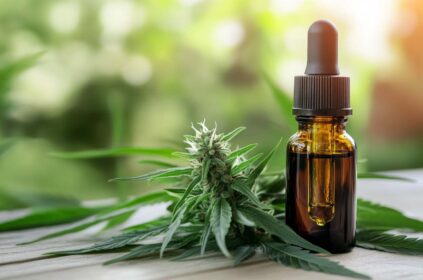The Impact of CBD on Mood: What You Should Know
In the bustling world of wellness, one natural compound has emerged as a beacon of hope for many seeking emotional balance, cannabidiol, or CBD. Distilled from the hemp plant, CBD is non-psychoactive, meaning it doesn’t produce the “high” associated with marijuana. Instead, its appeal lies in its potential to enhance mood, alleviate anxiety, and offer a sense of calm. As more people turn to this option for mental well-being, understanding how CBD affects mood becomes essential.
Understanding CBD and Its Mechanisms
At the heart of CBD’s interaction within the body lies the endocannabinoid system (ECS). This intricate network of receptors helps regulate a variety of bodily functions, including mood, stress response, and emotional regulation. Unlike its well-known counterpart, THC, which binds directly to CB1 receptors (the brain’s winners in the mood-altering game), CBD holds a subtler role. It interacts with serotonin receptors and various other molecular targets, making its influence both broad and nuanced.
Benefits of CBD for Mood Enhancement
The benefits of CBD in mood regulation are becoming increasingly supported by emerging research. Here’s a closer look at what the current studies reveal:
Anxiety Relief
Anxiety is a pervasive issue, affecting millions worldwide. Many studies highlight the anxiolytic properties of CBD, suggesting it can help reduce anxiety symptoms. For example, a 2019 study revealed that CBD effectively reduced anxiety in teenagers with social anxiety disorder, significantly outpacing a placebo. The results suggest that CBD may help individuals navigate the challenges posed by anxiety, offering a natural alternative to traditional anxiolytics.
Depression
While research on CBD’s efficacy for depression remains in earlier stages, anecdotal evidence and preclinical studies show promise. Preliminary data suggest that CBD could exert antidepressant effects by interacting with serotonin pathways. Human trials are limited but encouraging; participants have reported reduced depressive symptoms, particularly when CBD products are used alongside traditional therapies.
Stress Reduction
Stress is a common precursor to mood disorders, and CBD’s role as a stress-reliever is well-documented. A significant portion of users—about 70%—report using CBD specifically to alleviate stress, with many finding it effective for managing daily pressures without the side effects associated with pharmaceutical interventions.
Improved Sleep
Quality sleep is foundational for mental health. CBD may assist in improving sleep for individuals suffering from insomnia or other sleep disruptions. Though the data varies, some studies suggest that CBD can enhance sleep quality by addressing underlying anxiety and stress, allowing for a more restful night.
Effects of CBD on Emotional Health
Interaction with Serotonin Receptors
One of the key mechanisms behind CBD’s mood regulation is its interaction with serotonin receptors, particularly the type 1A receptor. This interaction can lead to enhanced serotonin signaling, which plays a critical role in the management of mood. As serotonin levels fluctuate, so can mood stability, making this pathway a promising route for therapeutic intervention.
Epigenetic Mechanisms
Interestingly, CBD may affect gene expression through epigenetic mechanisms. This means that CBD could potentially influence long-term emotional health by affecting how genes related to mood are expressed or regulated. While research in this area is still emerging, it opens new avenues for understanding how CBD can contribute substantively to mental wellness over time.
Current Research and Findings
User Reports and Studies
Surveys consistently indicate that CBD is used widely for various mental health concerns. Approximately 70% of users report positive effects in managing symptoms of anxiety, depression, and stress. While these findings are encouraging, the scientific community stresses the need for more extensive, high-quality longitudinal studies to support definitive claims.
Clinical Trials
Ongoing clinical trials are probing the therapeutic potential of CBD further. Research is focused on various populations, including those with social anxiety disorder and bipolar disorder. Initial findings indicate positive trends, but comprehensive studies are necessary to validate these results.
Potential Risks and Side Effects
While CBD is generally regarded as safe, potential side effects exist. Users might experience drowsiness, changes in appetite, or alterations in liver enzyme function. Careful consultation with a healthcare professional is advisable, especially for individuals taking other medications or managing existing health conditions. Considering the varying profiles of CBD products, ensuring clear communication with professionals can significantly enhance safety.
Real-World Examples and User Feedback
The anecdotal evidence surrounding CBD’s efficacy is vast. Many users describe profound changes in their daily lives, including heightened mood, lower stress levels, and improved sleep. However, it’s crucial to note that experiences vary widely. Some individuals may not find the desired effects or may encounter side effects. Thus, a cautious and personalized approach is recommended.
Conclusion and Next Steps
The landscape of CBD and its impact on mood presents a promising, albeit still evolving, narrative. As research progresses, individuals may discover CBD as a helpful addition to traditional mental health treatments. Here are some actionable takeaways:
- Consult Healthcare Professionals: Always seek guidance when considering CBD, particularly if you have underlying health conditions or are taking medication. A healthcare provider can help tailor a safe approach to your specific needs.
- Invest in Quality Products: Not all CBD is created equal. Ensure you are purchasing from reputable brands that prioritize transparency regarding product testing and ingredient sourcing.
- Stay Updated: The realm of CBD is continuously growing, with new studies emerging regularly. Keeping informed will help you navigate your wellness journey with greater confidence.
By fostering an understanding of CBD’s potential benefits and limitations, individuals can better harness its possible impact on mood and overall emotional wellness. In this ever-changing field, knowledge is power, empowering you to make informed choices that align with your health goals.
For those curious about the latest developments in CBD, there’s much more to explore. Engaging with current research and personal experiences can illuminate your path towards discovering how CBD might fit into your wellness toolkit.





















